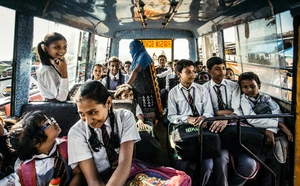“For a long time, Europeans thought of themselves as superior in cultural, political, intellectual and other ways. This perceived supremacy, the so-called eurocentrism, did not allow them to look at India, its people and culture without prejudice, stereotypes and racism,” says Prof. Dr Šarūnas Paunksnis.
Various racism-based attitudes found their way into representations in art and media. Unfortunately, these stereotypes persist. Although Lithuania has had fewer connections with India compared to other Western European countries, Dr Paunksnis and Dr Chakraborty Paunksnis, who also teach postgraduate students of Digital Culture at KTU FSSAH, analyse the stereotypes that have emerged in Lithuania and the extent to which they are spread, primarily through digital media.
Historical ties between Europe and India
Western European countries have historically had closer ties to India, resulting in a richer tradition of Indian representations, as opposed to Eastern European countries, which had limited contact with India. The historical ties between India and nations such as Great Britain, France, Portugal, and Denmark were rooted in colonialism and developed during the colonial era.
According to the KTU FSSAH scholars, the experiences of Eastern European countries in communicating with India were more modest, resulting in fewer representations of India in art, literature, popular media, or films and those that exist remain insufficiently examined.
The scholars and researchers at KTU FSSAH – Prof. Dr Šarūnas Paunksnis and Assoc. Prof. Dr Runa Chakraborty Paunksnis – represent KTU in the COST action “Europe’s Representations of India: Texts, Images, and Encounters”. During the project, the researchers will collect and analyse representations of India in various European countries, aiming to understand why certain representations began to dominate, the reasons behind their emergence, and the ways they spread. Scholars at KTU FSSAH will specifically analyse the representations of India in the contemporary Lithuanian media.
Building a digital platform including resources on Europe-India encounters
There have been efforts to change negative and ingrained attitudes. The education sector and academic institutions have been and still remain key ones in the fight against these attitudes and stereotypes. For decades, scholars from various disciplines have been working on forming critical attitudes towards colonialism and racism, analysing its impact and looking at the contemporary society and media.
During the project, scholars will not only attempt to analyse media representations of India-Lithuania encounters but also create a digital platform containing public resources related to representations of India prevailing in Lithuania and the rest of Europe. This platform will serve as a useful tool for research on Europe and India, as well as teaching and learning.




